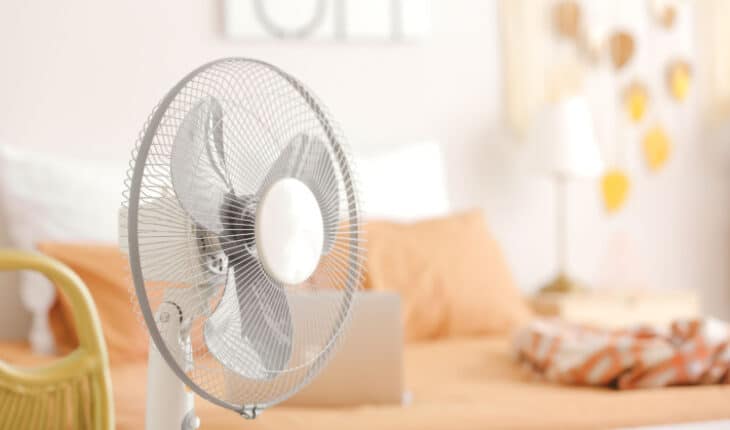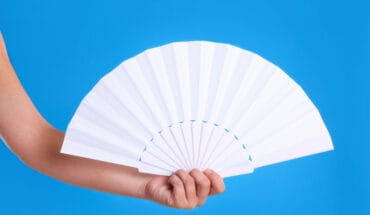The hot summer months can disrupt the usual process your body goes through before you sleep. The heat can make it harder for you to fall asleep and then stay asleep. If your sleep is broken early on, it hinders how long you’re able to stay in the deeper parts of the sleep cycle for, meaning you might wake up feeling groggier than usual, the next day.
Here, Dr Robin Clarke, Medical Director, Bupa UK, shares his top summer sleep hacks to keep your slumber salient.
1. Aim for the ideal temperature
For the best night’s sleep, it’s thought that a room temperature of 18°C is ideal. If you can, try to keep your bedroom as close as you can to this temperature throughout the day. It can be helpful to keep your blinds, curtains and windows closed during the daytime. Wait until the temperature dips in the early evening to open your windows – the air should be cooler.
2. Hay fever-proof your room
If you suffer from hay fever, keeping your windows open when the pollen count is high may be impossible. Make sure you frequently wash your bedding, and shower before bed to reduce the number of pollen particles you come into contact with.
Pollen screens and air purifiers may help to reduce the impact of the air in your bedroom, too.
3. Create a serene environment
Blackout curtains can be especially useful to help prevent early morning sunrises from getting in your eyes. Eye masks can be an effective way to stop you getting woken up by the sun, too.
Think about where you live – sleeping with the window open may help you to keep the room cooler, but it may also let in unwanted noises.
Consider using earplugs, running a fan or playing white noise on a sound machine or on your phone to drown out background noise and help you stay focussed on sleep.
4. Time your workouts well
Getting regular exercise is great for your physical and mental wellbeing, and even has influence on how well you sleep. However, working out close to bedtime isn’t advisable, especially when it’s hot outside.
If you’re already warmer than usual, raising your core temperature whilst exercising will make it even more difficult for you to fall asleep.
5. Limit your alcohol intake
This point is especially useful for those with allergies – wine, beers and spirits contain the chemical histamine that can set off allergy symptoms in your body, meaning you could become more sensitive to pollen.
What’s more, alcohol dehydrates you, which may worsen your sleep quality. Make sure you drink plenty of water during warmer months to keep your body working well and to protect your sleep quality.
6. Make wise bedding choices
Sleeping with bedding made of natural fibres, like cottons or linens, can help you to keep cooler as you’re drifting off. This is because synthetic materials, like polyester, aren’t as breathable. If you’re still struggling to sleep, swap out your duvet for a thin sheet.
7. Don’t be tempted to strip off
When you’re warm, you may think wearing less will help you to stay cooler. However, if you’re sweating, sleeping naked may make you feel more uncomfortable as there isn’t any fabric for the sweat to soak into. Some people find wearing lightweight cotton pyjamas help them stay cooler.
8. Freeze your bedding
If you like the cold side of the pillow, this tip is for you. Freezing your pillowcases for a couple of hours before you go to bed may help you to feel cooler and more relaxed as you get into bed.
9. Don’t change your sleep routine
It’s good to try and maintain a consistent sleep routine. This means aiming to go to sleep and wake up at around the same time each day – try not to change your sleep routine with the seasons.
Where you have social events, still try to take the time to wind down before bedtime to help you fall asleep, and keep those sleep hygiene habits.
10. Limit bright lights when it’s time to wind down
When the sun goes down, your body takes it as a signal that it’s time for sleep, but if you’re using bright, artificial lights – e.g., from a television or mobile device – it can confuse your body’s natural process and make it more difficult for you to drift off.
What’s more, the content you consume on these digital devices has the capacity to make you feel stressed or anxious. If you usually like to scroll on your phone or watch TV pre-bedtime, try instead to read a book, or spend a bit of time doing something you find relaxing, like arts and crafts.
Speak to a health professional if sleep is particularly difficult for you during the summer months, as it could be a sign of deeper routed sleep issues, like insomnia.
- Inspired into Action: Summer Sport Surge - 2nd August 2024
- 2024 Health Trends: What to Try and What to Avoid - 30th January 2024
- Menopause & sex: breaking the taboo for a better love life - 17th October 2023






